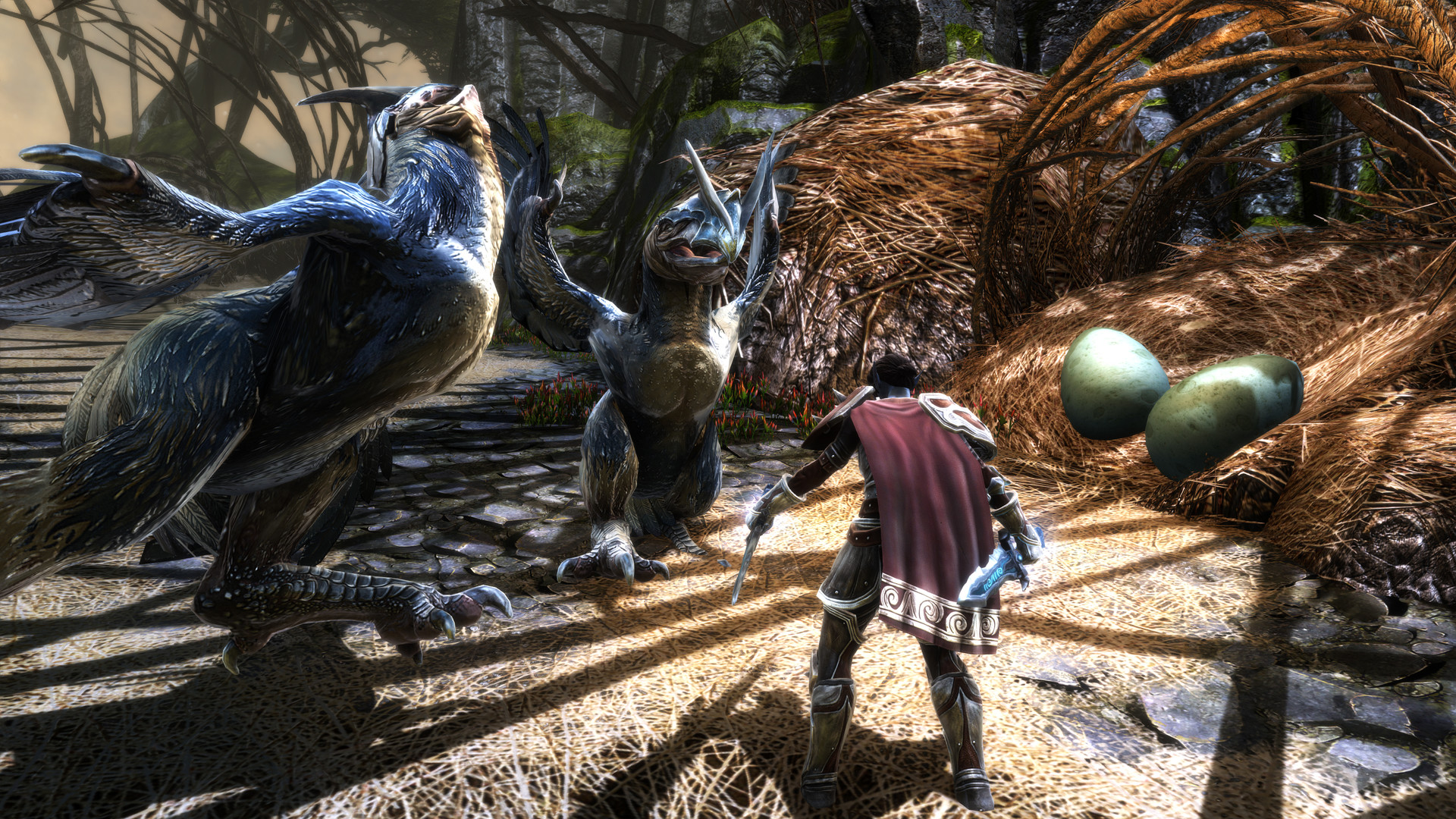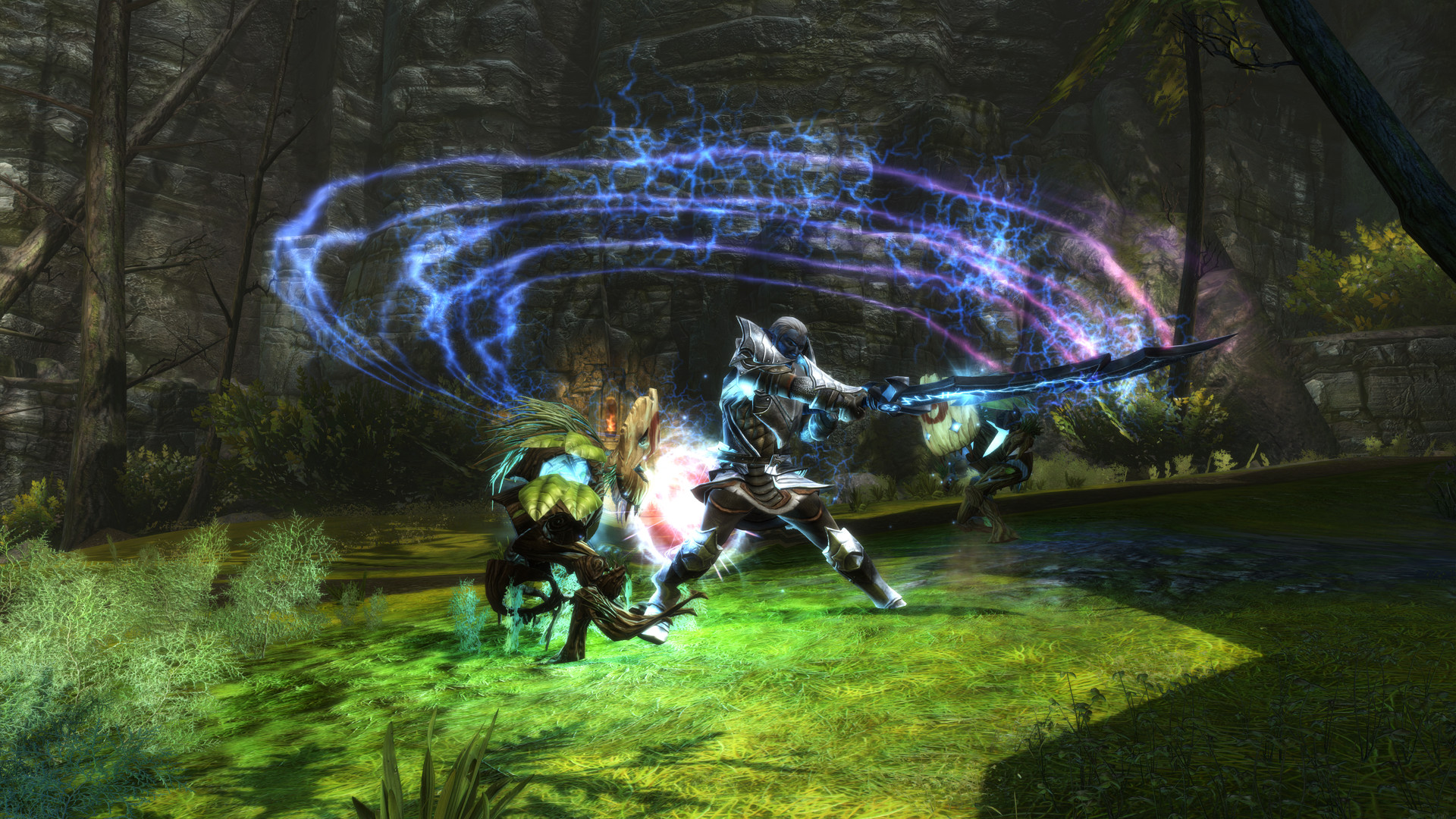Kingdoms of Amalur: Reckoning is mostly remembered for the scandal that followed it. It's not even that the game was a failure in itself, but it was intended to be the start of something bigger: a fantasy universe that would include an MMO to supplant World of Warcraft, beating the Blizzard behemoth at its own game of being a fantasy-ass fantasy game.
Of course it missed its shot at the king by about a mile, a wild pitch by ex-Red Sox ace Curt Schilling that managed to hit the unlucky employees and embroiled the government of Rhode Island in scandal for having supported the hopeless venture. So Kingdoms of Amalur: Re-Reckoning is here to make its case for the overlooked promise of the original, and here's the thing: despite being completely unmemorable and derivative, history has vindicated it. Here in 2020, every blockbuster game we play is Kingdoms of Amalur.
Let me explain: the story of Kingdoms of Amalur: Re-Reckoning is a simple one that’s familiar to anyone who’s dipped into epic fantasy over the past 50 years. You play a prophesied hero who emerges during an unprecedented war that includes mortals and immortals like. There are elves—I mean fae—and they’ve split into two factions, one of which is extremely evil and exists far to the east, where you are going to have to travel and whip ass to get the world back in order. There are different biomes, like forests and deserts, and there are approximately a million enemies to kill between here and there with slow swords or lightning-quick daggers or even magic. Nothing out of the normal here for the fantasy gamer.
The slight turn here centers on the concept of fate. In this world, fate is a predictable thing. There are people whose entire deal is accurately reading fate. They know when they’ll die, they’ll know when you die...and that seems to be about all they use it for: knowing when people die.
The player character, who I named Bjort, emerges into this world as a battlefield casualty who dies and then is reborn, untied from their fate. For the denizens of this universe, this is a huge deal because this person whose fate was changed changes everyone else’s fate when they come into contact with them: people who were meant to die are saved, and those who were meant to live are killed by the sword. Or magic, sometimes.
While this is an interesting wrinkle in the fantasy plot, the actual play of Re-Reckoning is standard fare. You fight enemies using familiar action game mechanics in tight clusters in an open world made out of corridors. You level up by doing so, and you put points into different classes to unlock specific skills with particular weapons. I decided to be a bow guy, and damn, I could really shoot a bow. You wander through a world absolutely crammed full of quests, and those quests are largely of the MMO sort: go kill X of Y; go gather A of B; the varmints have stolen my C of D, and I need that shit back ASAP. But this isn’t an online multiplayer game. It’s a single-player action RPG mimicking the structure of one.
It's no surprise, then, to remember they were at one point also trying to develop a Kingdoms of Amalur MMO.

As I played the first few hours of Re-Reckoning, often listening to podcasts at the same time, it dawned on me that I was playing Destiny 2. I was playing Call of Duty Modern Warfare and completing my daily missions. I was playing The Division 2 and helping out the civilians who always seem to need something every few hours. I was performing rote tasks, spread out thinly but constantly in front of me, seemingly stretching out into eternity. I was playing something that was harvesting my attention and energy, only offering back the most generic plot details, with very little of it paying off into broad narrative movement forward. _Kingdoms of Amalur_’s whole deal is a central pillar of game design now.
And I know that that’s not entirely accurate. It was the confluence of MMO’s like World of Warcraft and the mobile gaming revolution that made the game industry stand up and realize that video games could sink themselves deeply into your life if they allowed players to check for regularized awards by offering daily missions as breadcrumbs to larger accomplishments. MMOs also pushed the sheer magnitude of what was available to a player; rather than one thin pathway forward, there were entire zones of choice, all filled with relatively similar content that was distinguished by whether you were killing big lizards, big bugs, or humanoids.
But the reason that Amalur gives me such a weird feeling is that it brought those design elements into the single player space, showing that those things work for solo play, and helping demonstrate a pathway for aligning the gameplay systems for online and offline games. It’s hard to look at Kingdoms of Amalur in 2012 and Destiny in 2014 and see anything other than some ideas coming full circle. If certain mechanics work equally in online and offline games, then stapling them together was sure to be a winning formula.

Maybe I’m just primed to look for curves in the lines of fate. After all, Kingdoms of Amalur was developed by Big Huge Games after their acquisition by 38 Games, the game company that received $75 million dollars from the taxpayers of Rhode Island and then rode that horse right into the dirt. Like Bjort, it was supposed to be dead as a doornail.
Yet, after acquisitions and some updating work, here the game is again. It’s resurrected, and I can’t help but feel that the world changed somehow after that initial encounter in 2012. Our collective fate was changed. In a different universe we’re exclusively playing baroque Morrowind clones, no one outside of MMORPGs have ever heard of grinding for gear, and we don’t ever have to collect 10 Kobold Skulls from the Spider Pits of Yorgh. We probably don’t go down there at all.
I’m not mad about the world we live in. I enjoy these games as much as anyone else, although I certainly don’t dedicate my life to them in a serious way. But playing Re-Reckoning is an interesting moment of revisiting a moment when these things weren't quite mapped out, where the design was novel, and it feels like the embryonic form of the world we live in now.
At its best, it’s a harmless action game with too much to do and relatively engaging combat that feels like a logical progression of something like the Gauntlet games. At its worst, it’s an abyss of golden exclamation points and proper nouns that all run into each other in the stilted dialogue. Both of these things are happening simultaneously, weaved together like the threads of fate.
from VICE US https://ift.tt/2Fb5Ywg
via cheap web hosting
No comments:
Post a Comment